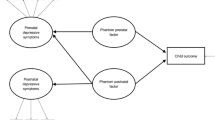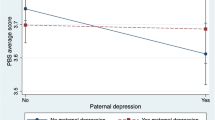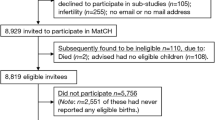Abstract
Despite the abundance of research investigating the associations between maternal depressive symptoms (MDS) and children’s cognitive development, little is known about the putative mechanisms through which depressive symptoms are associated with children’s cognitive development. The aim of this review was to summarize the literature on family mediators (i.e., maternal parenting behaviors, mother-child interactions, and family stress) involved in this association in early childhood. The review includes seven studies, five longitudinal and two cross-sectional, which tested putative mediators of the association between MDS and children’s cognitive development. Studies were selected from online databases (PubMed, PsycNet) and manual searches. Only studies which quantitatively assessed associations between MDS in the postnatal period and child cognitive development in early childhood (i.e., 0–5 years) and included mediator variables were included in the review. Six out of seven studies identified mediating variables. The mediators included maternal responsiveness, parenting style, family dysfunction, the quality of the home environment, and maternal caregiving practices. Different mediators were identified across the reviewed studies. Maternal depressive symptoms are partly associated with child cognitive development via family processes and parenting practices. Various mediating processes are at play. Further research is needed on the role of maternal and paternal mental health and gene-environment correlations in this association. A better understanding of the mediating pathways is needed for the design of preventative intervention targeting specific family processes.

Similar content being viewed by others
References
Ahun MN, Geoffroy MC, Herba CM, Brendgen M, Seguin JR, Sutter-Dallay AL, ... Cote SM (2017) Timing and chronicity of maternal depression symptoms and children’s verbal abilities. J Pediatr 190:251–257. https://doi.org/10.1016/j.jpeds.2017.07.007
American Psychiatric Association (2013) Diagnostic and statistical manual of mental disorders: DSM-5, 5th edn. AMA, Washington DC
Augustine JM, Crosnoe R (2010) Mothers’ depression and educational attainment and their children’s academic trajectories. J Health Soc Behav 51(3):274–290. https://doi.org/10.1177/0022146510377757
Bagner DM, Pettit JW, Lewinsohn PM, Seeley JR, Jaccard J (2013) Disentangling the temporal relationship between parental depressive symptoms and early child behavior problems: a transactional framework. J Clin Child Adolesc Psychol 42(1):78–90
Bandura A (1995) Exercise of personal and collective efficacy in changing societies. In: Bandura A (ed) Self-efficacy in changing societies. Camridge University Press, New York, pp 1–45
Baron RM, Kenny DA (1986) The moderator-mediator variable distinction in social psychological research: conceptual, strategic, and statistical considerations. J Pers Soc Psychol 51(6):1173–1182
Beck CT (1995) The effects of postpartum depression on maternal-infant interaction: a meta-analysis. Nurs Res 44(5):298–304
Beck CT (1998) The effects of postpartum depression on child development: a meta-analysis. Arch Psychiatr Nurs 12(1):12–20
Belsky J (1984) The determinants of parenting: a process model. Child Dev 55(1):83–96
Bowlby J (1988) A secure base. Basic Books, New York
Brazelton TB, Koslowski B, Main M (1974) Origins of reciprocity: the early mother-infant interaction. In: Lewis M, Rosenbloon L (eds) Effects of the infant on its caregiver. Wiley, New York
Brennan PA, Hammen C, Andersen MJ, Bor W, Najman JM, Williams GM (2000) Chronicity, severity, and timing of maternal depressive symptoms: relationships with child outcomes at age 5. Dev Psychol 36(6):759–766
Bronfenbrenner U (1979) The ecology of human development: experiments by nature and design. Harvard University Press, Cambridge
Burke L (2003) The impact of maternal depression on familial relationships. Int Rev Psychiatry 15(3):243–255. https://doi.org/10.1080/0954026031000136866
Censullo M, Lester B, Hoffman J (1985) Rhythmic patterning in mother-newborn interaction. Nurs Res 34(6):342–346
Chen HH, Hwang FM, Wang KL, Chen CJ, Lai JC, Chien LY (2013) A structural model of the influence of immigrant mothers’ depressive symptoms and home environment on their children’s early developmental outcomes in Taiwan. Res Nurs Health 36(6):603–611. https://doi.org/10.1002/nur.21566
Chi TC, Hinshaw SP (2002) Mother-child relationships of children with ADHD: the role of maternal depressive symptoms and depression-related distortions. J Abnorm Child Psychol 30(4):387–400
Cichetti D, Rogosch FA, Toth SL (2000) The efficacy of toddler-parent psychotherapy for fostering cognitive development in offspring of depressed mothers. J Abnorm Child Psychol 28:135–148
Cooper PJ, Murray L, Wilson A, Romaniuk H (2003) Controlled trial of the short- and long-term effect of psychological treatment of post-partum depression. I. Impact on maternal mood. Br J Psychiatry 182:412–419
Cornish AM, Mcmahon CA, Ungerer JA, Barnett B, Kowalenko N, Tennant C (2005) Postnatal depression and infant cognitive and motor development in the second postnatal year: the impact of depression chronicity and infant gender. Infant Behav Dev 28:407–417
Elder GH, Caspi A (1988) Economic stress in lives: developmental perspectives. J Soc Issues 44(4):25–45
Epstein N, Baldwin L, Bishop D (1983) The McMaster Family Assessment Device. J Marital Fam Ther 9:171–180
Evans J, Melotti R, Heron J, Ramchandani P, Wiles N, Murray L, Stein A (2012) The timing of maternal depressive symptoms and child cognitive development: a longitudinal study. J Child Psychol Psychiatry 53(6):632–640. https://doi.org/10.1111/j.1469-7610.2011.02513.x
Field T (1995) Infants of depressed mothers. Infant Behav Dev 18:1–13
Forman DR, O’Hara MW, Stuart S, Gorman LL, Larsen KE, Coy KC (2007) Effective treatment for postpartum depression is not sufficient to improve the developing mother-child relationship. Dev Psychopathol 19(2):585–602. https://doi.org/10.1017/s0954579407070289
Fritz MS, Mackinnon DP (2007) Required sample size to detect the mediated effect. Psychol Sci 18(3):233–239. https://doi.org/10.1111/j.1467-9280.2007.01882.x
Gartstein MA, Bridgett DJ, Dishion TJ, Kaufman NK (2009) Depressed mood and maternal report of child behavior problems: another look at the depression–distortion hypothesis. J Appl Dev Psychol 30(2):149–160
Goodman JH (2004) Paternal postpartum depression, its relationship to maternal postpartum depression, and implications for family health. J Adv Nurs 45(1):26–35
Goodman SH, Gotlib IH (1999) Risk for psychopathology in the children of depressed mothers: a developmental model for understanding mechanisms of transmission. Psychol Rev 106(3):458
Goodman SH, Rouse MH, Connell AM, Broth MR, Hall CM, Heyward D (2011) Maternal depression and child psychopathology: a meta-analytic review. Clin Child Fam Psychol Rev 14(1):1–27
Goodman SH, Tully E (2008) Children of depressed mothers. Handbook of depression in children and adolescents. Guilford Press, New York, pp 415–440
Grace SL, Evindar A, Stewart DE (2003) The effect of postpartum depression on child cognitive development and behavior: a review and critical analysis of the literature. Arch Womens Ment Health 6(4):263–274. https://doi.org/10.1007/s00737-003-0024-6
Grantham-McGregor S, Cheung YB, Cueto S, Glewwe P, Richter L, Strupp B (2007) Developmental potential in the first 5 years for children in developing countries. Lancet 369(9555):60–70. https://doi.org/10.1016/s0140-6736(07)60032-4
Hayes AF (2009) Beyond Baron and Kenny: statistical mediation analysis in the new millennium. Commun Monogr 76(4):408–420
Heckman JJ (2006) Skill formation and the economics of investing in disadvantaged children. Science 312(5782):1900–1902
Herbers JE, Garcia EB, Obradović J (2017) Parenting assessed by observation versus parent-report: moderation by parent distress and family socioeconomic status. J Child Fam Stud 26(12):3339–3350
Howard LM, Molyneaux E, Dennis CL, Rochat T, Stein A, Milgrom J (2014) Non-psychotic mental disorders in the perinatal period. Lancet 384(9956):1775–1788. https://doi.org/10.1016/s0140-6736(14)61276-9
Kelly Y, Bartley M, Schoon I, Hope S (2004) Parents’ health. In: Dex S, Joshi H (eds) Millenium Cohort Study first survey: a user’s guide to initial findings. Centre for Longitudinal Studies, London
Kiernan KE, Huerta MC (2008) Economic deprivation, maternal depression, parenting and children’s cognitive and emotional development in early childhood. Br J Sociol 59(4):783–806. https://doi.org/10.1111/j.1468-4446.2008.00219.x
Lanes A, Kuk JL, Tamim H (2011) Prevalence and characteristics of postpartum depression symptomatology among Canadian women: a cross-sectional study. BMC Public Health 11(302). https://doi.org/10.1186/1471-2458-11-302
Letourneau NL, Dennis CL, Benzies K, Duffett-Leger L, Stewart M, Tryphonopoulos PD, ... Watson W (2012) Postpartum depression is a family affair: addressing the impact on mothers, fathers, and children. Issues Ment Health Nurs 33(7):445–457. https://doi.org/10.3109/01612840.2012.673054
Letourneau NL, Tramonte L, Willms JD (2013) Maternal depression, family functioning and children’s longitudinal development. J Pediatr Nurs 28(3):223–234. https://doi.org/10.1016/j.pedn.2012.07.014
Liu Y, Kaaya S, Chai J, McCoy DC, Surkan PJ, Black MM, ... Smith-Fawzi MC (2017) Maternal depressive symptoms and early childhood cognitive development: a meta-analysis. Psychol Med 47(4):680–689. https://doi.org/10.1017/s003329171600283x
Logsdon MC, Wisner KL, Pinto-Foltz MD (2006) The impact of postpartum depression on mothering. J Obstet Gynecol Neonatal Nurs 35(5):652–658. https://doi.org/10.1111/j.1552-6909.2006.00087.x
Lovejoy MC, Graczyk PA, O’Hare E, Neuman G (2000) Maternal depression and parenting behavior: a meta-analytic review. Clin Psychol Rev 20(5):561–592
Lund, C., Breen, A., Flisher, A. J., Kakuma, R., Corrigall, J., Joska, J. A., . . . Patel, V. (2010). Poverty and common mental disorders in low and middle income countries: a systematic review. Soc Sci Med, 71(3), 517–528. https://doi.org/10.1016/j.socscimed.2010.04.027
MacKinnon DP, Lockwood CM, Hoffman JM, West SG, Sheets V (2002) A comparison of methods to test mediation and other intervening variable effects. Psychol Methods 7(1):83–104
Malin JL, Karberg E, Cabrera NJ, Rowe M, Cristaforo T, Tamis-LeMonda CS (2012) Father-toddler communication in low-income families: the role of paternal education and depressive symptoms. Fam Sci 3(3–4):155–163. https://doi.org/10.1080/19424620.2012.779423
Marcus SM (2009) Depression during pregnancy: rates, risks and consequences—Motherisk Update 2008. Can J Clin Pharmacol 16(1):e15–e22
Maxwell SE, Cole DA (2007) Bias in cross-sectional analyses of longitudinal mediation. Psychol Methods 12(1):23
Maxwell SE, Cole DA, Mitchell MA (2011) Bias in cross-sectional analyses of longitudinal mediation: partial and complete mediation under an autoregressive model. Multivar Behav Res 46(5):816–841
Milgrom J, Westley DT, Gemmill AW (2004) The mediating role of maternal responsiveness in some longer term effects of postnatal depression on infant development. Infant Behav Dev 27:443–454
Minuchin P (1985) Families and individual development: provocations from the field of family therapy. Child Dev 56(2):289–302
Murray L (1992) The impact of postnatal depression on infant development. J Child Psychol Psychiatry 33(3):543–561
Murray L, Cooper P, Hipwell A (2003a) Mental health of parents caring for infants. Arch Womens Ment Health 6(Suppl 2):S71–S77. https://doi.org/10.1007/s00737-003-0007-7
Murray L, Cooper PJ, Wilson A, Romaniuk H (2003b) Controlled trial of the short- and long-term effect of psychological treatment of post-partum depression: 2. Impact on the mother-child relationship and child outcome. Br J Psychiatry 182:420–427
Netsi E, Pearson RM, Murray L, Cooper P, Craske MG, Stein A (2018) Association of persistent and severe postnatal depression with child outcomes. JAMA Psychiatry. https://doi.org/10.1001/jamapsychiatry.2017.4363
O’Hara MW, Stuart S, Gorman LL, Wenzel A (2000) Efficacy of interpersonal psychotherapy for postpartum depression. Arch Gen Psychiatry 57(11):1039–1045
Paulson JF, Bazemore SD (2010) Prenatal and postpartum depression in fathers and its association with maternal depression: a meta-analysis. JAMA 303(19):1961–1969. https://doi.org/10.1001/jama.2010.605
Pearson C, Janz T, Ali J (2013) Mental and substance use disorders in Canada. Statistics Canada Ottawa, Ontario
Piteo AM, Yelland LN, Makrides M (2012) Does maternal depression predict developmental outcome in 18 month old infants? Early Hum Dev 88(8):651–655. https://doi.org/10.1016/j.earlhumdev.2012.01.013
Plomin R, DeFries JC, Loehlin JC (1977) Genotype-environment interaction and correlation in the analysis of human behavior. Psychol Bull 84(2):309
Robertson E, Grace S, Wallington T, Stewart DE (2004) Antenatal risk factors for postpartum depression: a synthesis of recent literature. Gen Hosp Psychiatry 26(4):289–295. https://doi.org/10.1016/j.genhosppsych.2004.02.006
Scarr S, McCartney K (1983) How people make their own environments: a theory of genotype→ environment effects. Child Dev:424–435
Sethna V, Murray L, Netsi E, Psychogiou L, Ramchandani PG (2015) Paternal depression in the postnatal period and early father-infant interactions. Parent Sci Pract 15(1):1–8. https://doi.org/10.1080/15295192.2015.992732
Sohr-Preston SL, Scaramella LV (2006) Implications of timing of maternal depressive symptoms for early cognitive and language development. Clin Child Fam Psychol Rev 9(1):65–83. https://doi.org/10.1007/s10567-006-0004-2
Stein A, Malmberg L-E, Sylva K, Barnes J, Leach P, team., t. F (2008) The influence of maternal depression, caregiving, and socioeconomic status in the post-natal year on children’s language development. Child Care Health Dev 34(5):603–612. https://doi.org/10.1111/j.1365-2214.2008.00837.x
Sutter-Dallay AL, Murray L, Dequae-Merchadou L, Glatigny-Dallay E, Bourgeois ML, Verdoux H (2011) A prospective longitudinal study of the impact of early postnatal vs. chronic maternal depressive symptoms on child development. Eur Psychiatry 26(8):484–489. https://doi.org/10.1016/j.eurpsy.2010.05.004
van der Waerden J, Bernard JY, De Agostini M, Saurel-Cubizolles M-J, Peyre H, Heude B, ... Group, E. M.-C. C. S. (2016) Persistent maternal depressive symptoms trajectories influence children’s IQ: the EDEN mother-child cohort. Depress Anxiety 34:105–117
Wachs TD, Black MM, Engle PL (2009) Maternal depression: a global threat to children’s health, development, and behaviour and to human rights. Child Dev Perspect 3(1):51–59
Walker SP, Wachs TD, Gardner JM, Lozoff B, Wasserman GA, Pollitt E, Carter JA (2007) Child development: risk factors for adverse outcomes in developing countries. Lancet 369(9556):145–157. https://doi.org/10.1016/s0140-6736(07)60076-2
Walker SP, Wachs TD, Grantham-McGregor S, Black MM, Nelson CA, Huffman SL, ... Richter L (2011) Inequality in early childhood: risk and protective factors for early child development. Lancet 378(9799):1325–1338. https://doi.org/10.1016/s0140-6736(11)60555-2
Wanless SB, Rosenkoetter SE, McClelland MM (2008) Paternal depression and infant cognitive development. Implications for research and intervention. Infants Young Child 21(2):134–141
Zajicek-Farber ML (2010) The contributions of parenting and postantal depression on emergent language of children in low-income families. J Child Fam Stud 19:257–269
Author information
Authors and Affiliations
Corresponding author
Ethics declarations
Conflict of interest
The authors declare that they have no conflict of interest.
Ethical approval
This article does not contain any studies with human participants or animals performed by any of the authors.
Rights and permissions
About this article
Cite this article
Ahun, M.N., Côté, S.M. Maternal depressive symptoms and early childhood cognitive development: a review of putative environmental mediators. Arch Womens Ment Health 22, 15–24 (2019). https://doi.org/10.1007/s00737-018-0870-x
Published:
Issue Date:
DOI: https://doi.org/10.1007/s00737-018-0870-x




